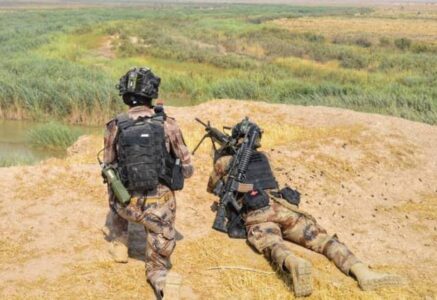
How a village’s revenge for rape became an Islamic State attack
It was late on 4 September when news broke of a deadly attack on an Iraqi federal police guard post near the town of Al-Rashad in Kirkuk province.
By the following day details about the incident were starting to emerge.
An official statement by the Iraqi security forces’ media unit described clashes between federal police and Islamic State gangs. Military commanders in Baghdad told reporters that everyone at the guard post had been killed in a gun battle after running out of ammunition.
Federal police officers told Middle East Eye that at least 12 officers from the Second Regiment – Brigade 19 / Fifth Division were dead.
Nine had been on duty at the guard post. Three more were killed and six wounded in two roadside bombings which prevented reinforcements from reaching the scene of the attack.
The rugged and sparsely populated southwestern countryside of Kirkuk province has long been a hotspot for Iraqi security forces.
It has remained a hiding place from where IS militants have been able to regroup and launch ambushes since losing territorial control of large areas of northern and western Iraq in 2017.
But a Middle East Eye investigation, based on interviews with security forces and officials on the ground in Kirkuk province and in Baghdad, challenges official accounts of the attack.
It reveals a cover-up orchestrated by senior police officers and military commanders to conceal what really happened that night by blaming the attack on IS.
Instead, MEE has learnt that the attack was carried out by villagers intent on avenging an alleged rape by two police officers based at the guard post.
MEE has also learnt that reports that the police officers died in a gun battle are untrue.
In fact, according to sources involved in the federal police’s own investigation, the officers were killed – some of them beheaded and mutilated in their beds – without firing a shot after their attackers were able to infiltrate the guard post undetected.
Federal police officers involved in the investigation told MEE that no one at the guard post had reported the attack or called for reinforcements. When investigators finally reached the guard post the following day, they said, they found boxes of ammunition untouched.
A senior Fifth Division police officer told MEE: “Thermal camera records showed that the nine were all asleep when the attack happened.”
Even a police officer who was supposed to be monitoring the thermal camera footage from a remote location was asleep at the time of the attack, he said.
“Our men were killed by negligence and recklessness, not by a lack of ammunition,” he added.
Sources who have reviewed the camera footage told MEE that the attack was carried out by six armed men who approached the guard post on foot.
The attack was eventually reported by police a few kilometres away alerted by the sound of gunfire.
Fifth Division commanders then sent out a support force, which was hit by a roadside bomb about two kilometres from the guard post, killing three police officers and wounding six.
A second support force also hit a bomb. Although there were no casualties, the commander decided to return to base.
Investigators have not yet concluded whether the bombings were directly linked to the attack on the guard post. IS militants often plant explosives on roads used by security forces, especially in remote areas around Al-Rashad.
But, according to MEE’s sources, by then everyone at the guard post was already dead.
Three days before the attack, an adolescent girl was tending cattle nearby. There are dozens of small rural settlements in the area and MEE is not naming the village where the girl is from because of the sensitivity of the issue.
According to a senior police officer familiar with the investigation into the attack, two police officers at the guard post that afternoon noticed that the girl was alone and the area was deserted.
They forced the girl to accompany them “and they took turns raping her”, he said. Numerous sources confirmed details of the incident to MEE.
“Those who carried out the attack on the guard post are from the village. The girl’s brothers and cousins were the ones who carried out the operation,” a senior police officer told MEE.
Investigators have concluded that the attackers knew the identities of the two police officers they were looking for, as well as two others who they accused of involvement in covering up the incident.
These four were separated in the bedroom of the guard post from the other five police officers, who were woken and marched at gunpoint into the courtyard outside.
“What we saw was shocking and brutal,” a police officer involved in the investigation told MEE. “The attackers tried to emulate the IS style, but they didn’t quite succeed.”
According to MEE’s sources, the two police officers who had been identified as the girl’s attackers were beheaded in their beds. Their killers also cut off their genitals.
The two police officers accused of covering up the rape were also killed where they had been sleeping. The head of one was smashed in with a stone. MEE’s sources did not say how the other police officer was killed.
Investigators believe the attackers did not intend to kill the remaining five police officers.
“But things got out of hand,” said one officer. One of the attackers became “irritated”, he said, and opened fire, killing them all.
MEE understands that security forces raided the attackers’ village a few days later but all of the men suspected of being involved had fled. Local sources told MEE the girl and her family have decided not to bring a complaint against the police.
Source: Middle East Eye





